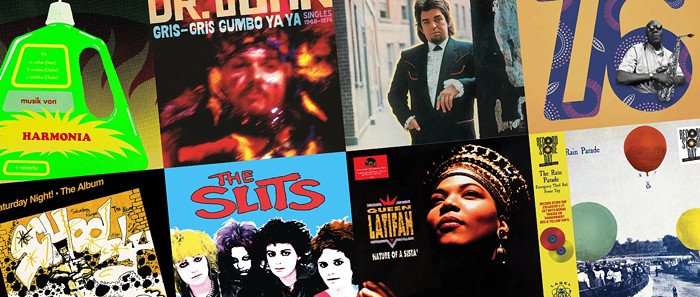Two weeks ago, the Program sold out all five nights of its run at Neumo's, a coup not only for Blue Scholars or Mass Line but for all of Northwest hiphop. That's 4,000 people, which is like three sold-out nights at the Showbox, or two at the Showbox Sodo. That's huge.
On Thursday night, Neumo's was, like in the preceding nights of the series, packed. Neumo's staff had to remove the barrier dividing all-ages from 21+ on the main floor, effectively making the whole showroom all-ages, because so many kids showed up. During Blue Scholars' headlining set, the room was a sea of hands, waving and pumping in time with Sabzi's beats and Geologic's raps.
In the bar upstairs, Program organizer Dave Meinert was smiling and calm in the midst of all the activity. Khingz walked by and Meinert told him, "Your set was great." The MC, visibly ecstatic, replied, "I don't remember anything."
According to a source, there was a fight backstage. Smack talk posted on message board 206Proof between the "Wake Up and Smell the Hiphop" T-shirt guys and Saturday Knights MC Barfly grew into a confrontation; Barfly reportedly landed several punches. Only in Seattle, or maybe Microsoft's Redmond campus, would a real, fist-fighting hiphop beef come from some message-board bullshit. The Program is a scene in a way that Seattle rock shows haven't been for maybe a decade. Plans are already underway for a sequel next year.
Compare this to two other shows happening that night, the Three Imaginary Girls' Christmas party at El Corazón and DJ Collage at Chop Suey, and you start to get an idea of exactly how and why hiphop is so ascendant in Seattle right now.
The Three Imaginary Girls bill themselves as "Seattle's Sparkly Indie-Pop Press," and their party, relocated from the recently closed Croc, reflected that focus with the smart power pop of Tullycraft, a set from Rachel Flotard (Visqueen) and friends, and opener Your Favorite Book, whose acoustic solo performance triangulates somewhere in between the Weakerthans' John K. Samson, the Mountain Goats' John Darnielle, and Sicko's Ean Hernandez.
Midway through Your Favorite Book's set, two security staff came running out from the backstage, through the crowd. They looked as though one was chasing the other. Then, smoke started to seep out from the backstage, thin but foul smelling, like melting plastic. Onstage, YFB looked worried. Someone in the crowd shouted, "You're burning down the house!" A photographer snapped some photos of the smoke. Nobody really panicked or evacuated, although a couple people headed to the bar once the place started to smell. After a long minute, one of the security guys ran backstage with a fire extinguisher. Later, an employee told me, "There was an electrical fire backstage. They had to discharge a fire extinguisher." YFB finished his set, breaking a string on the final, too-punk-for-acoustic-guitar song.
Granted, it was only 10:00 p.m., but the attendance was underwhelming. One couldn't help but think of Charles Mudede's assertion on Slog that the Crocodile closing while the Program sells out to 4,000 people represents a kind of sea change in Seattle, from being an indie-rock (or, historically, "grunge") town to something else—the huge mass of underage Blue Scholars fans certainly seems to point in that direction.
Later, at Chop Suey, DJ Collage was playing to an even sparser audience, maybe a dozen people, despite his show generating some buzz on the local Division mailing list (supposedly, Collage is being scouted by some serious labels). Midway through his confident set of futuristic dancehall, Collage confessed, "I'm disappointed with the turnout tonight. I've been doing a lot of stuff up in Vancouver... I come from all over—Seattle, Chicago, Austria—and you're hard-pressed to find this kind of heat in Seattle."
So why is Seattle sleeping on the sparkly indie pop and the city's best/only dancehall MC and flocking to the Program?
Maybe it's a matter of inclusivity. Indie pop, ragga—these are niche genres that define themselves, to a great degree, by what they're not. They're isolationist. Indie pop, for example, has to come from artists working independently of big business, and, by TIG's standards, it has to be "sparkly."
On the other hand, hiphop's greatest power is its essential ability for assimilation, its all-inclusiveness. Because the music has as its basis the beat (which is universal), the rap (which is as infinitely malleable as any lyrical form), and the sample (which can be anything), hiphop can eat and digest damn near any other music—funk, disco, electro, indie rock—and spit it back out, transformed. Hiphop can be all those things, but all those things can't necessarily be hiphop.
This point became clear at the peak moment of Blue Scholars' set that Thursday night, during the Seattle anthem "Inkwell," when Sabzi dropped the hook from Modest Mouse's "Float On" to massive roars from the crowd. With several hundred people singing along, it's hard to put much stock in the chant from "Back Home" about hiphop being "just malnourished and underfed." In the Northwest at least, hiphop is gorging—on rock, among other things—and it's never looked healthier. ![]()


















